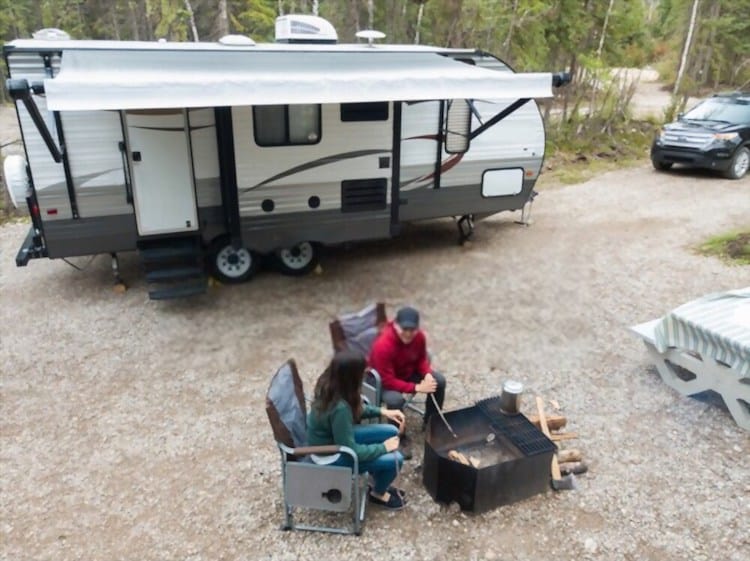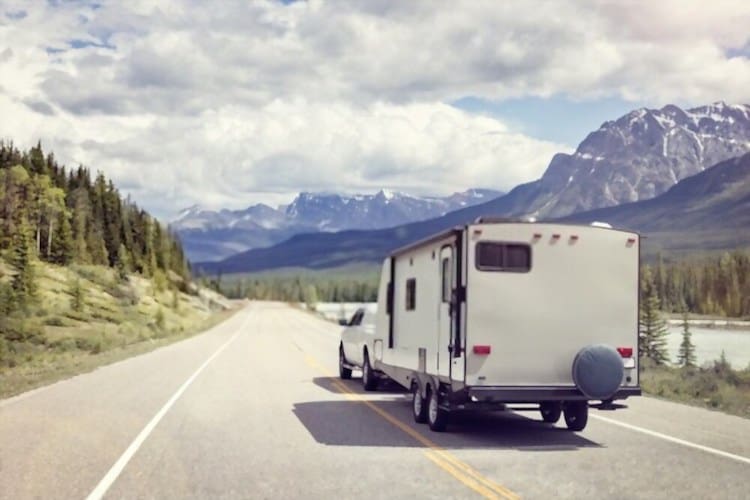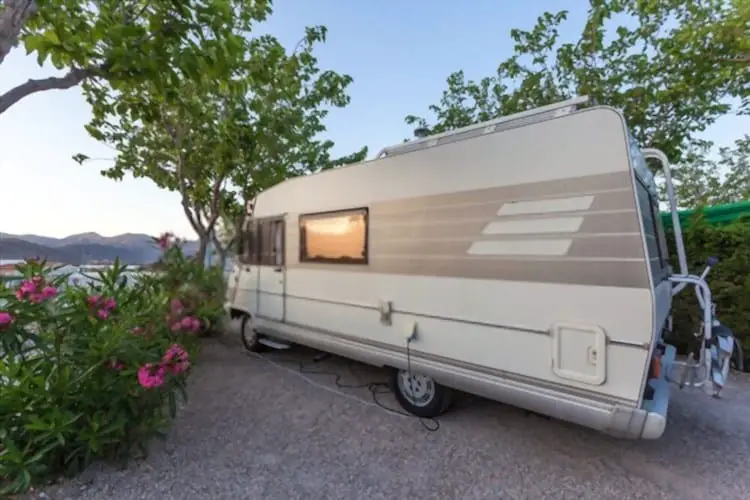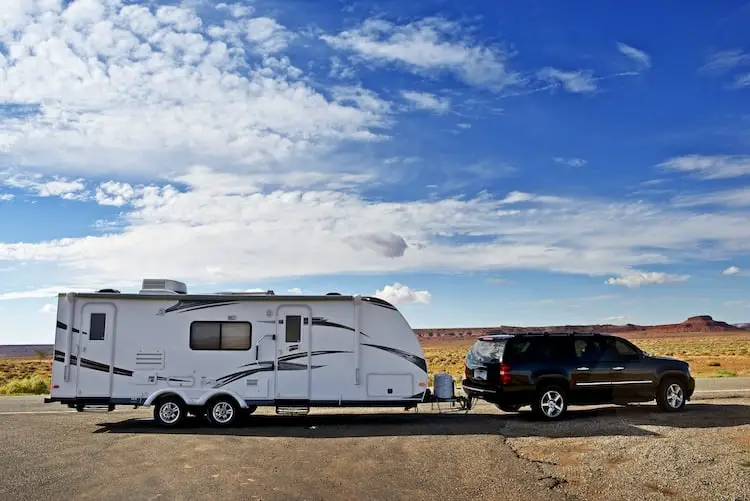Published Date: August 11, 2020
Last Updated on December 16, 2022 by
How much does a pop-up camper weigh? This is one of the numerous questions we often hear people asking, and we’re going to address it today.
A pop-up camper is a tow-recreational vehicle that brings the luxury of a home on the road – although it has limited capacity and rooms for amenities, as well as passengers.
Therefore, knowing its weight will help you determine the right towing vehicle to use, how many people can join the ride, and other camping necessities to carry along, to avoid misfortune on the road.
So, I will tell you how much a pop-up camper weighs (in detail), so you can know your camper’s carrying capacity to enjoy more budget-friendly and convenient camping.
To put it succinctly, the average weight of a popup camper can vary, just like a 5th wheel or any travel trailer considering their usefulness and size.
For example, a hard-sided pop-up camper, similar to an Aliner, can weigh between 1,180 to 2,700 lbs.; while a tent-style popup weighs from 1,300 to 3,700 lbs. There are also sport-style pop-ups today weighing between 1,722 to 3,377 lbs.
Table of Contents
How Much Does A Pop Up Camper Weigh?

First of all, we need to discuss the different sizes and weights of pop-up campers. This will enable us to determine exactly what impacts the weight of a trailer.
There are various types of pop-up camper that come in nearly all shapes and sizes. Below are the three general sizes of a camper and how much it weighs:
Mini-Sized Pop-Ups
The mini-sized pop-up camper favors only weekend travelers who can make do with little space and really don’t care about all the extra amenities.
It is an excellent choice for a couple or family with little kids looking forward to disconnecting from the digital work and plugging themselves into nature – like going on weekend hunting and fishing trips with the buds.
Small-sized Pop-ups weigh 500 pounds and can go up to 1,000 pounds – depending on the amenities.
They are relatively easy to tow, unload, and set up in just a few minutes, without tearing or wearing.
On top of that, you can take turns on the road without facing a steep set of heavier loads on your back.
It has limited storage and a couple of fold-out chairs and a table. However, most mini-sized pop-ups have a basic kitchen, drawers, and compact sleeping quarters.
Like the Fancier units may come with an entertainment system, bathrooms, and outdoor showers.
You have to know the fewer amenities you have, the lighter the camper becomes, resulting in less consumption of fuel – so keep that in mind as well.
Medium-Sized Pop-Ups
Unlike the mini-sized models, the Medium-sized pop provides sufficient space for up to four campers without struggling for legroom or cluttering amenities.
They are for an annual family vacation to the lake because there is a lot of storage for two sleeping quarters, a compact kitchen, a dinette, and more.
Trailers in this category can weigh from 1,000 to 1,500 pounds, yet you can use a standard car (SUV or Crossover) to tow this unit without much hassle.
Thousands of campers are using the medium pop-ups, mainly because it is an affordable option to use in exploring the hidden excitement behind nature.
On the other hand, it requires a vehicle with more towing capacity.
The traveling rate will be a bit slow, as well as the maneuverability when taking turns because it weighs more. And, this could result in spending extra cash on gas due to heavier hauling.
Large-Sized Pop-Ups
If you want to get the most out of your vacation with a pop-up camper, go for a large size.
Large-sized pop-up campers are the best of both worlds — a tent and a travel trailer that weighs from 1,600 to 3,700 pounds. And, can expand up to 17 to 25 feet.
They are ideal for couples or families with children willing for a perfect road trip because it has adequate storage.
It can house more amenities and camping necessities like tables to eat off, kitchens with running water, cooktops, ample countertops, and gas, as well as a standard pop-out sleeping quarter, plus a slide-out.
Besides providing all the necessities needed for an outdoor adventure getaway, the real beauty of the pop-up camper lies within its price tag. They are affordable, especially for used units.
The only drawback this hefty category has is more weight. It weighs more than the mini and medium-sized campers above.
Regardless of its weight, towing is no big deal, especially if you have a heavy-duty truck, SUV, minivan, or even Sedan.
More importantly, larger campers provide you with maximum protection against natural elements better than a mini or medium-sized camper.
And, it requires less maintenance and is easier to manage compared to a 30-foot travel trailer, yet it offers the same comforts of home.
In some cases, even more convenient – depending on the model or where you live.
What Impacts The Weight Of A Pop Up Trailer?

If you’re still asking “how much does a pop-up camper weigh,” then the first step to answering this is to know some of the things that impact the weight of a pop-up camper.
My Apologies, but I really place my finger on a particle factor that impacts the weight of a pop-up camper.
A lot of factors can influence the weight of a pop-up camper. But, it depends solely on the manufacturer because he or she gets to decide on what type of material to use for the construction and other add-ons.
I know from experience that size doesn’t determine the weight. Two pop-up trailers of equal length could have a significant difference in weight.
Strangely enough, small pop-ups with fewer amenities can outweigh a larger camper. To put it bluntly, it all boils down to the materials used.
If you are still curious about the weight of a pop-up camper, here are some weight measurements worth noting when purchasing one.
Do You Need Trailer Breaks?
According to Wikipedia, a trailer brake is an electrical device or module that is usually mounted on the driver’s side of a tow vehicle’s dashboard. It’s designed to engage a trailer’s electrical braking system either time-delayed or in proportion to the tow vehicle’s brake engagement when coming to a halt or slowing down.
According to the experts, any pop-up camper that weighs more than 3,000 lbs. will require trailer brakes. However, it’s been proven that any camper over 2,500 lbs. with an option for trailer brakes, is usually a safer and wiser option.
If your car isn’t fortified with the brake controller, you can easily have a controller installed in your tow car. Your mechanic, an RV dealer, or a facility such as U-Haul can easily help you with this.
Bear in mind that you may get varying pricing, and it’ll be good to get some estimates on this before making your final decision on your preferred pop-up.
The weight of the standard features in a pop-up camper is usually included in the UVW. Some of the features you may find include:
- Air conditioning
- Water heater
- Awning
- Mattress pads
- Lights/with fans
- Fire extinguisher
- Stove
- Outside grill
- Portable toilet
- Microwave
- Propane tank
- Shades/curtains
- Refrigerator
- Spare tire
- Carbon monoxide detector
- Etc.
You may also add a few optional pieces of equipment as cargo, such as:
- Bicycles and rack
- Extra shelving
- Water hose
- Kayak or canoe and rack
- Generator
- Electrical cords
- Cooler
- Chairs
- Outdoor folding table
- Etc.
That’s not all, your clothing, food, toiletries, cooking utensils/appliances, beverages, pots, dishes, bedding, pans, TV, and laptop.
Basic Weight Ratings on Camper

UVW (Unloaded Vehicle Weight): It refers to the weight of the camper as manufactured at the factory. It includes equipment fluids weight, full engine, and fuel tank weight – all but cargo, propane, water, or dealer-installed accessories.
CCC (Cargo Carrying Capacity): The CCC denotes the amount of weight available for amenities and other camping necessities you can safely pack into your trailer.
GAWR (Gross Axle Weight Rating): The gross axle weight rating of a camper is the maximum number the GAW (Gross Axle Weight) on a single axle should never exceed. It is the total weight the axles can carry safely.
GVWR (Gross Vehicle Weight Rating): The Gross Vehicle Weight Rating stands for the combined weight of a popup camper’s hitch and its carrying capacity weight.
The manufacturer puts the GVRW into perspective for the safe operation of your camper.
However, if you are interested in getting a pop-up camper that can carry all your gears virtually anywhere and behind almost any vehicle, here are some recommendations:
Mini-sized pop-up camper:
- Livin’ Lite Quicksilver 8.0 (994 pounds)
- The TigerMoth camper (900 pounds)
- Sylvan sport go pop up camper (800 pounds)
- Clipper Pop-Up camper by Coachmen (600 pounds)
Medium-sized pop-up camper:
- Colorado Teardrops Canyonland (1,100 pounds)
- Scamp Campers (1,200 pounds)
- Taxa Cricket Trek (1,500 pounds)
- Jayco 8SD Jay Sport (1,500 pounds)
Large-sized Pop-up camper:
- Viking Epic Series (1,600 pounds)
- Starcraft Comet (1,840 pounds)
- Forest River Flagstaff Tent Camper range (2,500 pounds)
- Air Opus (2,870 pounds)
Word of advice: ensure the camper has a low UVW but has higher GVRW capacity that meets your camping needs.
Do You Need Pop-up Camper Weight Distribution Hitch?
The Weight Distribution Hitch is a device that is designed to help you balance out a pop-up camper that is towed by your tow vehicle. It’s a very useful device and comes in handy when there’s too much pressure on your vehicle due to the weight of the load.
Sadly, towing something extremely large, heavy, or too high can lead to instability during the ride, which can also result in both your vehicle and the pop-up camper rolling over. Aside from that, it can also make you lose control of the car, run off the road, or even cause an accident.
Safety comes first while traveling in your car and a pop-up. So, you should always check your vehicle’s towing capabilities before making a move. See whether or not you will need to get a Weight Distribution Hitch.
According to the experts, a Weight Distribution Hitch will be needed if the weight of your fully-loaded pop-up camper is 50% greater than the weight of your towing vehicle.
Conclusion
The towing vehicle you are about to use has its load, so any additional weight could either alleviate or worsen your driving experience.
And, that is why the question: How much does a pop-up camper weigh is crucial for better towability and storability
However, if you are less concerned and the heaviness hits the peak, your gas mileage will suffer, which leads to a tedious drive and rapid consumption of fuel.

